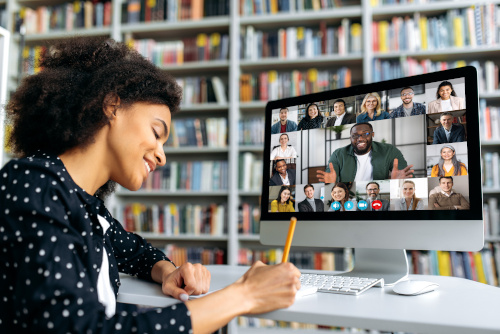
3 tips for maximizing the impact of professional learning
Using professional learning as an opportunity to evolve enables educators to grow and positively impacts the lives of students, the school, and the district community
By Cory Camp, Director of Professional Learning, Sibme January 5th, 2022It’s one thing to attend a professional learning or instructional coaching session—but taking what you’ve learned and putting it into action is another. Most often, it’s the experiences built upon collaboration, reflection, and active change that make the biggest difference.
My time as a classroom educator helped me realize a passion for helping fellow teachers learn and grow. It inspired a mission to transform professional learning into something that’s focused on teacher collaboration, learning and follow-through.
With this in mind, I compiled the following tips for getting the most out of professional learning and coaching sessions.
#1 Embrace the experience
When I first transitioned from teacher to coach, I remember feeling frustrated with the lack of impact that my professional development and coaching was providing. That’s because it was your typical “sit and get” experience where attendees learned something in the moment, but likely forgot about it as soon as the session was over. In coaching, I observed a teacher and “provided feedback” on what I saw–while teachers were often receptive to new ideas to try, any change was often short-lived.
This lack of impact is what led me to push for the use of video to enhance our professional learning and coaching sessions. I would have attendees pick one thing they learned to try out in the classroom, have them record it, and then use that video to self-reflect. I built in time for us to collaborate, so we could swap ideas and discuss what was and wasn’t working in the classroom. With those I coached, I recorded when I would visit and allow them time to see what I saw and let them lead the conversation based on their own reflections and questions.
By actively embracing the professional learning experience, rather than being a passive participant, educators find more meaning in what they learn, improving the experience for them–and for myself
#2 Be comfortable with vulnerability
About 12 years ago, I decided to start recording my classes so that students could go back and review previous lessons. I recorded several videos–about eight–over a two-week period.
When I went back to watch the recordings, I deleted all eight videos in the first five seconds. I didn’t like the sound of my voice, or what I was doing with my hands. My hair didn’t look great that day–my classroom was a mess.
Going back and watching yourself, or sharing a recording of yourself with someone else, is a challenging thing to do.
But, again, I was doing this for the students–not for myself. So, I recorded new videos and made myself watch each of them. This was an “aha” moment. I realized that almost all the things that went well during class were things I had not built into that day’s lesson but were done on the fly.
There were also things I realized I needed to work on, that I’m still working on to this day. Like many of my fellow teachers, I can be a fast talker, and, especially when I’m tired, I have a thick Southern drawl, and when that comes in, it can be hard to understand what I’m saying. More aware than ever, I took what I learned and revised my teaching.
Video became an invaluable reflective tool for me. In every role, I’ve leaned on video to drive sustainable change.
I’m a huge advocate for professional learning opportunities that use video to drive reflection and change. Even if video isn’t built into a PD opportunity, educators can still use it to self-monitor the implementation of a strategy they learned, look at student learning, and identify what is (or isn’t) working in the classroom.
#3 Reflect and follow through
In education, it is not hard to find new ideas and instructional strategies. It can be hard to change our practice, however. That’s where reflection comes in.
Reflection is central to how our mindsets work and how we shift our behavior. Allowing time for doing “the dirty work”—applying what we’ve learned and then reflecting on our progress—is a key ingredient to successful PD.
Learning never stops.
Whatever field you’re in, you’ve got to keep learning. If you don’t have a good grasp on where you are or where you’re supposed to be, that can be near impossible.
Using professional development as an opportunity to learn and evolve does not only enable educators to grow, but also to positively impact the lives of their students, school, and district community.
About the Author:Cory is an educator passionate about transforming education at all levels and changing the way we learn and collaborate. As Director of Professional Learning for Sibme, host of The Coach Replay Show, and creator and lead facilitator of The Coaching Cohort, Cory helps leaders and coaches all over the world to transform professional learning experiences and outcomes through video and blended strategies. Free Resource: [Video] Cory’s Top 5 Personal Growth Books.